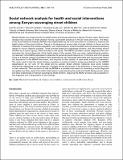| dc.contributor.author | David Ayuku, Wilson Odero, Charles Kaplan, Rene De Bruyn, Marten De Vries | |
| dc.date.accessioned | 2020-08-11T08:58:04Z | |
| dc.date.available | 2020-08-11T08:58:04Z | |
| dc.date.issued | 2003-03-01 | |
| dc.identifier.citation | 63 | en_US |
| dc.identifier.uri | https://repository.maseno.ac.ke/handle/123456789/1968 | |
| dc.description.abstract | Street children are a high priority for health policy and service planning in Kenya. Poverty, wars, famine and disease have resulted in street children having a persistent presence in African cities and towns. The Maastricht Social Network Analysis (MSNA) was implemented as the core instrument in a battery to measure the health status of the street children. Owing to the absence of census data of street children in Kenya and the difficulty in tracking this mobile population, we implemented a mixed snowball and convenience sampling design to recruit research subjects. Three hundred street and orphanage children, and 100 primary school children as a control group, were included in the study. The MSNA provided a social diagnosis that complements the clinical diagnosis of the health status of the sample. Only one main methodological question is presented: is the MSNA applicable to describe the personal social networks of (1) children and of (2) people living in a Kenyan culture? Qualitative field observations, key informant interviews and focus groups inform the adaptation of the MSNA instrument, and improve its face validity. A case series analysis is presented. The main result is that the street children population consists of distinct subgroups defined by the UNICEF classification as ‘on’ and ‘of’ the street and by gender. Street children networks have some notable deficiencies depending on the subgroup. Constant across the groups is the deficiency of service providers in their networks. The conclusion is that the MSNA is a suitable instrument for obtaining a social diagnosis and gathering other useful information that helps in understanding the social and health backgrounds, status and daily experiences of Kenyan scavenging street children. Applying the MSNA protocol was successful in the diagnosis and interpretation of the findings. | en_US |
| dc.publisher | Oxford University Press | en_US |
| dc.subject | : Maastricht Social Network Analysis, street children, social networks, health status, Kenya | en_US |
| dc.title | Social network analysis for health and social interventions among Kenyan scavenging street children | en_US |
| dc.type | Article | en_US |

